NC State Extension Teaches Youth the Importance of Agriculture
go.ncsu.edu/readext?1069657
en Español / em Português
El inglés es el idioma de control de esta página. En la medida en que haya algún conflicto entre la traducción al inglés y la traducción, el inglés prevalece.
Al hacer clic en el enlace de traducción se activa un servicio de traducción gratuito para convertir la página al español. Al igual que con cualquier traducción por Internet, la conversión no es sensible al contexto y puede que no traduzca el texto en su significado original. NC State Extension no garantiza la exactitud del texto traducido. Por favor, tenga en cuenta que algunas aplicaciones y/o servicios pueden no funcionar como se espera cuando se traducen.
Português
Inglês é o idioma de controle desta página. Na medida que haja algum conflito entre o texto original em Inglês e a tradução, o Inglês prevalece.
Ao clicar no link de tradução, um serviço gratuito de tradução será ativado para converter a página para o Português. Como em qualquer tradução pela internet, a conversão não é sensivel ao contexto e pode não ocorrer a tradução para o significado orginal. O serviço de Extensão da Carolina do Norte (NC State Extension) não garante a exatidão do texto traduzido. Por favor, observe que algumas funções ou serviços podem não funcionar como esperado após a tradução.
English
English is the controlling language of this page. To the extent there is any conflict between the English text and the translation, English controls.
Clicking on the translation link activates a free translation service to convert the page to Spanish. As with any Internet translation, the conversion is not context-sensitive and may not translate the text to its original meaning. NC State Extension does not guarantee the accuracy of the translated text. Please note that some applications and/or services may not function as expected when translated.
Collapse ▲Ask a typical fourth-grader where their food comes from, and they will likely say something like, “the grocery store.”
Ask a fourth-grader from Sampson County, and you’ll get a much more detailed response. They can tell you that food comes from a farmer who raises animals or grows crops.
They can also tell you that their county is No. 1 in North Carolina in the number of hog farms. They know that pigs produce not just bacon, ham, and pork roast and chops — the hair is used in paint and makeup brushes, and the lard can be an ingredient in soap and cosmetics.
They know that, just like humans, pigs require a balanced diet that includes protein and carbohydrates. And they just might be excited about a career in the swine industry or some other aspect of agriculture.
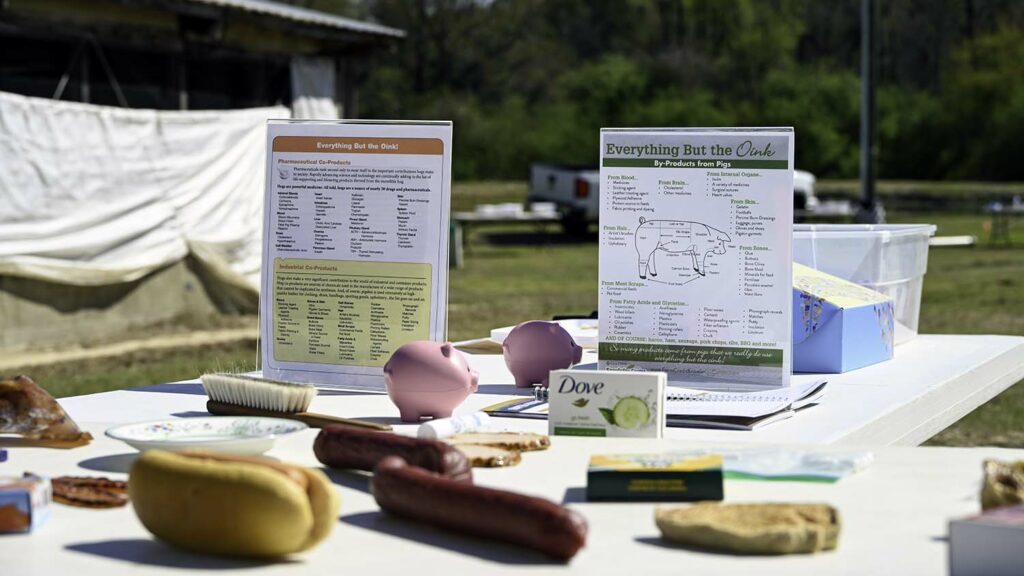
Sampson County fourth-graders attending Youth Pork Day learned that just about every part of a pig can be used — everything but the oink.
Bringing Agriculture to Life for Students
Every fourth-grader in the Sampson County School District learned those facts, and more, during Youth Pork Day, an event coordinated by NC State Extension.
“This is one component of our program on youth ag education,” said Eileen Coite, agriculture and community development agent at Extension’s Sampson County Center. “We want them to learn an appreciation for agriculture. It feeds us and clothes us. Sometimes I go into classrooms and teach, but I like to bring the kids out to the farm. It’s a great experience for them. They really look forward to it.”
Youth education is a key component of NC State Extension outreach efforts. Across the state, Extension experts teach students and other community members about the importance of agriculture and the vital role that farmers play in the local economy.
“It is extremely important that we teach our young people the value of agriculture,” said Dalton Dockery, Extension’s director for the Southeast district. “We hope programs like this encourage them to go into some field of agriculture, whether it be traditional farming or whether it be agribusiness.”
As district director, Dockery oversees NC State Extension efforts in 18 counties. All have similar education programs centered on important local commodities.
“This is one of the best things we can do,” he said. “Typically, Extension agents work with adults. I’m glad to see us working with youth at a younger age and preparing them for the future, not only in 4-H, but in these types of settings as well.”
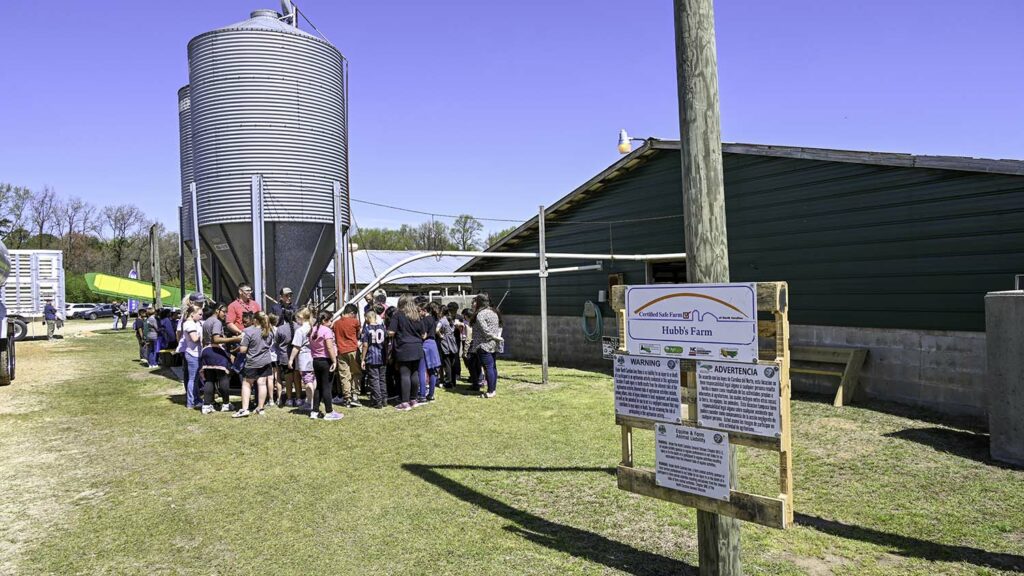
Nearly 600 fourth-graders in Sampson County learned about the importance of agriculture to their community and the state at Youth Pork Day, an event organized by NC State Extension.
A Farm with a New Purpose
The Sampson County event took place at Hubb’s Farm, an agritourism destination with a depopulated swine operation. Nearly 600 schoolchildren rotated between five stations, learning about the parts of a pig, feed, housing, lagoons and career opportunities.
“This is fun,” said farm owner Tammy Peterson as she looked around at the children eagerly lapping up the information. “It’s something we take for granted, our way of life. Opening our farm to the public can be a bridge between the general public and the agriculture industry.”
Peterson and her husband, John, began converting their working farm into an agritourism and education stop in 2008. Biosecurity became a concern as more folks were coming out, so they chose to close the swine operation. They kept the hog houses, though.
“My family started in the swine industry back in the late ‘80s,” Tammy Peterson said. “We were among the first farms to build houses for hogs. I thought we could utilize these buildings for education.”
Allowing children and the public into the buildings on education days and demonstrating the living conditions of the hogs helps to demystify the swine industry.
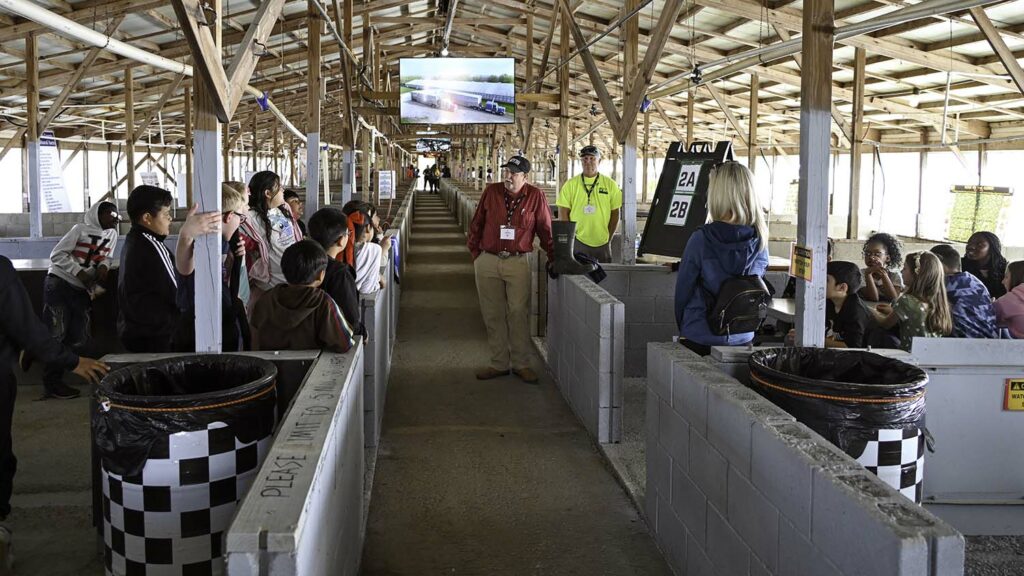
Students learned about how living conditions for swine during a tour of a depopulated hog house.
“They can see that the reason we keep them inside is we’re protecting them from the environment, we’re protecting them from predators, we’re protecting them from disease,” Peterson said. “There’s so many reasons that it’s a better environment for them. It’s climate controlled and we can keep an eye on them instead of them just roaming around.”
Related: Extension strengthens the North Carolina swine industry
Inspiring Careers in Agriculture
The schoolchildren received a complete education from volunteers from Extension, NC State’s College of Agriculture and Life Sciences, the University of Mount Olive, Sampson Community College, local industry professionals, and area farmers.
They also learned about future career opportunities in the agriculture industry. One of the stations was operated by professionals from industry giants Smithfield Foods, Prestage Farms, Hog Slat and others.
“We call it the ag career station,” Coite said. “The instructors are talking to them about the different jobs that are out there. Maybe you don’t have the desire to work with pigs every day. But you might want to be in maintenance or you might want to drive heavy equipment, or you may want to be a veterinarian. You may want to be a nutritionist. You may want to be an HR specialist. There’s just so many different jobs.”
The lesson can be reinforced in the classroom. Each teacher received a publication of the North Carolina Farm Bureau called an Ag Mag that shows a variety of careers connected to agriculture.
“Even at that age, I hope that they’re starting to think about what do I want to do down the road,” Coite said. “We want them to learn there are opportunities out there in our rural community. They don’t have to go to the big city.”
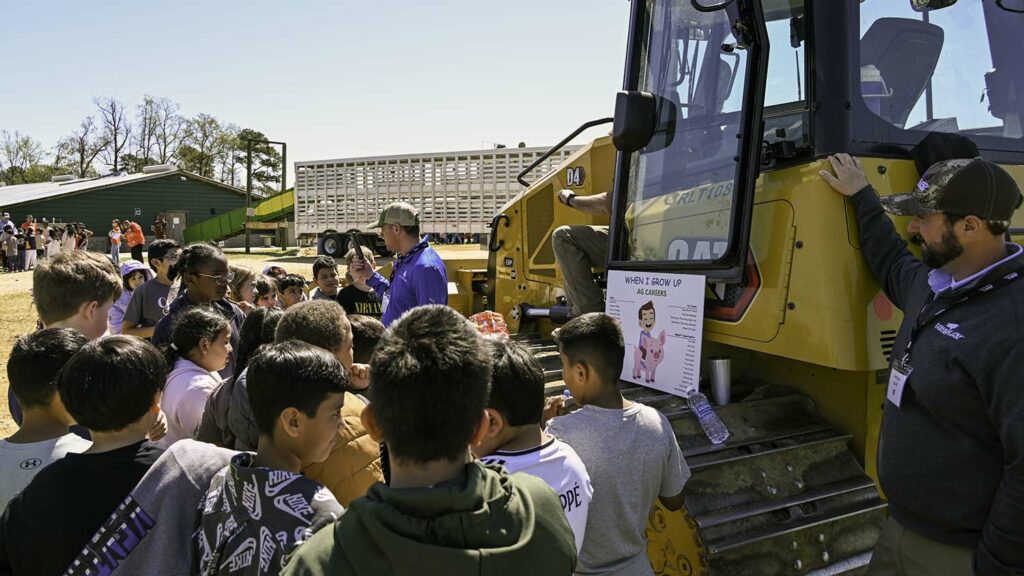
The ag career station provided information on jobs the fourth-graders can pursue when they are older.
Reconnecting Rural Communities to Their Roots
Sampson County is one of North Carolina’s largest agricultural counties, ranking among the state’s leaders in crops and livestock. It is very rural, with approximately half the land being farmed. But that doesn’t necessarily give residents a greater appreciation of farmers.
“There is a huge disconnect even here in Sampson County with not only kids but with their parents on how their food is grown, how it’s raised, how it comes from the farm to the fork,” said Brad Hardison, director of Extension’s county center. “We drive by it every day and don’t even think about what’s in the field out there or what’s in those houses off the road. We take for granted what is on our table and the choices that we have. It’s safe, nutritious, healthy food that our farmers here in Sampson County and all over North Carolina are meticulously growing and preparing for us.”
The career station was also important to Hardison, who has always worked in agriculture-related fields.
“A lot of our employment is moving out of the county,” he said. “We’d like to keep those here in the county. One big option is the pork industry.”
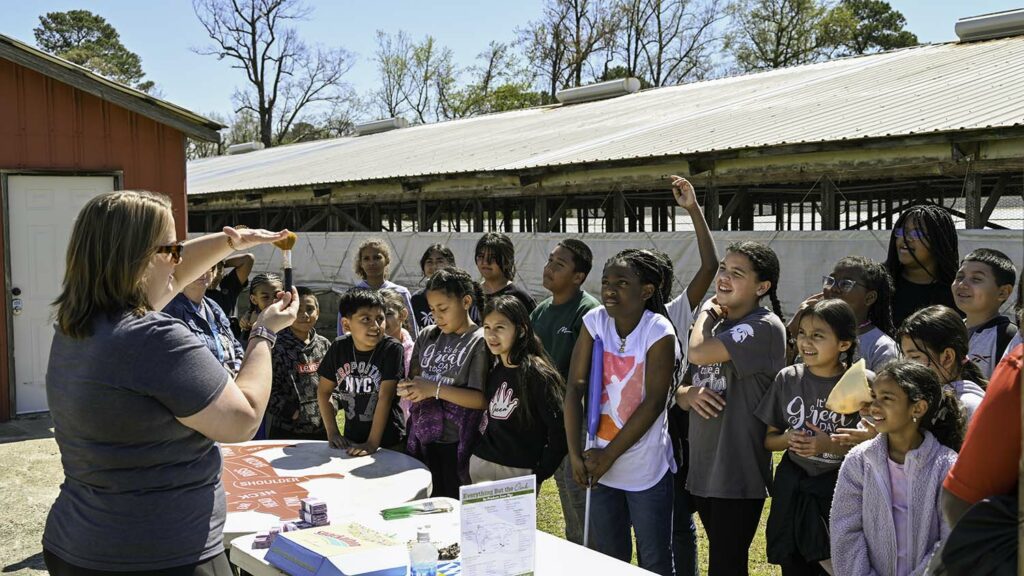
Sampson County fourth-graders learned many facts about the swine industry at Youth Pork Day, including that pigs produce not just meat. The hair is used in paint and makeup brushes, and the lard can be an ingredient in soap and cosmetics.
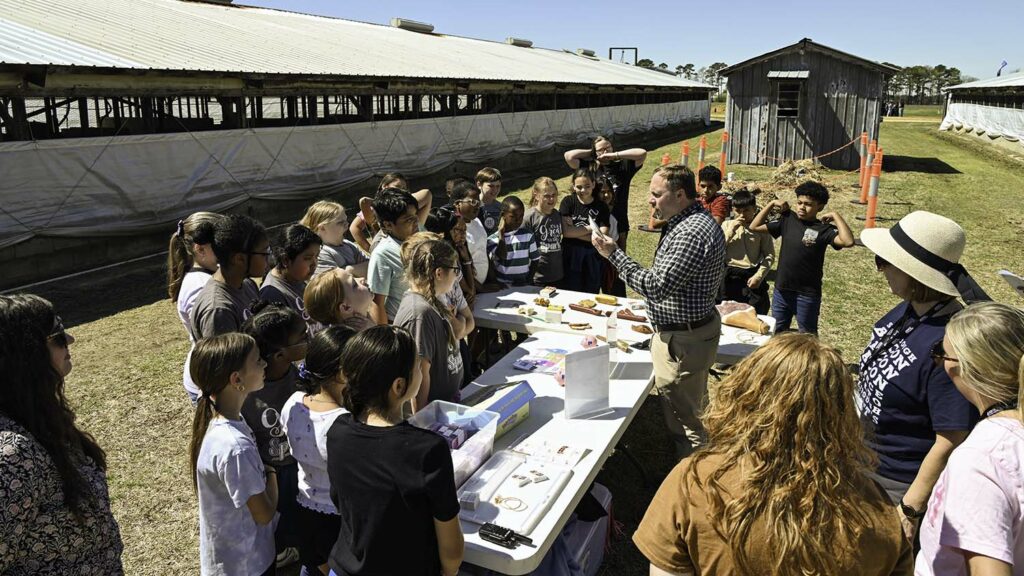 Food, Farming and the Future
Food, Farming and the Future
Alicia Najera with Prestage Farms was one of the professionals educating the fourth-graders about opportunities available to them in a few years.
“We’re out here to teach the kids that agriculture is big and there are many sectors of employment,” she said. “There’s lots of components to the industry. We have feed mills, feed labs, diagnostic labs, truck drivers, mechanics. There are office jobs, accounting, the IT department, safety department, the human resources department. There’s many different jobs.”
Fourth-grade might seem early to be thinking about future jobs, but the students would disagree.
“The No. 1 question we are getting is, ‘At what age do you hire?’” Najera said.
While Najera was telling the kids about internship opportunities available when they turn 16, Extension swine specialists Mark Knauer and Eduardo Beltranrena were at a nearby station demonstrating what hogs eat.
“We’re talking about energy and protein and vitamins and minerals, and about the basic ingredients that go into a diet,” Knauer said. “Nutrition in pigs is very similar to nutrition in humans. A lot of things crossover, so thinking about nutrition at any stage I think is important for people.”
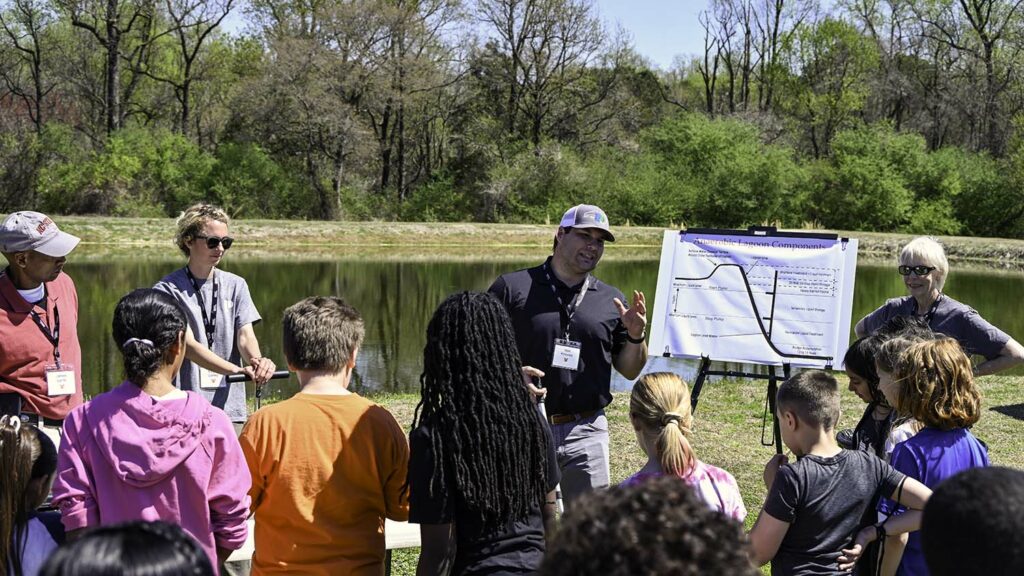
Max Knowles, NC State Extension livestock agent in Sampson County, explains how lagoons on hog farms operate.
Like all the experts donating a day to participate in Youth Pork Day, Knauer also appreciates the importance of educating youth about agriculture and farmers.
“As we’ve gone through the decades, we have fewer and fewer people that grow up on farms, or whose parents or grandparents grew up on farms,” he said. “Events like this are definitely good for the kids to get out on a farm and talk with people in the industry and learn about how their food is produced.”
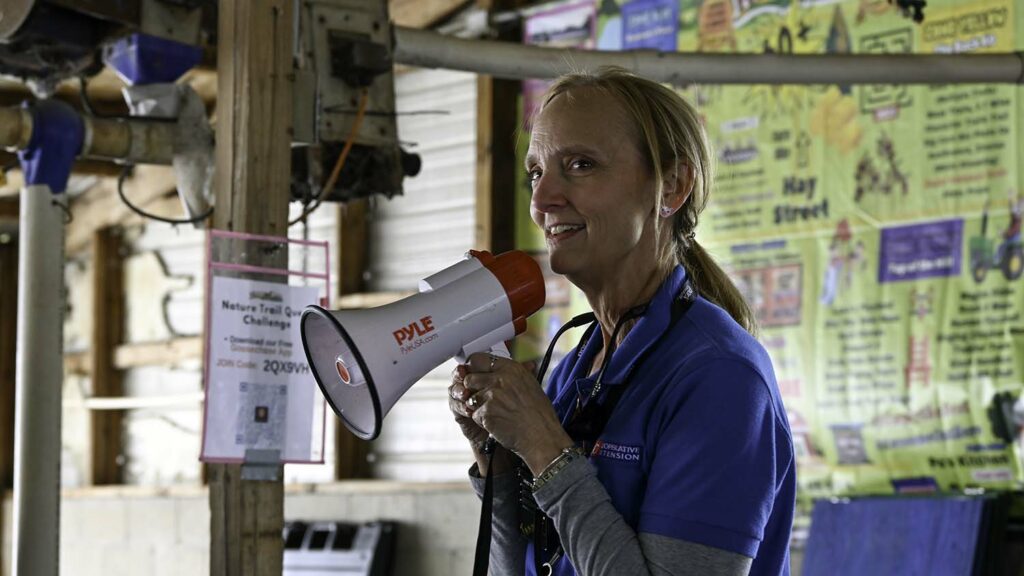
Eileen Coite, agriculture and community development agent at Extension’s Sampson County Center and organizer of Youth Pork Day, gives instructions before schoolchildren arrive.

